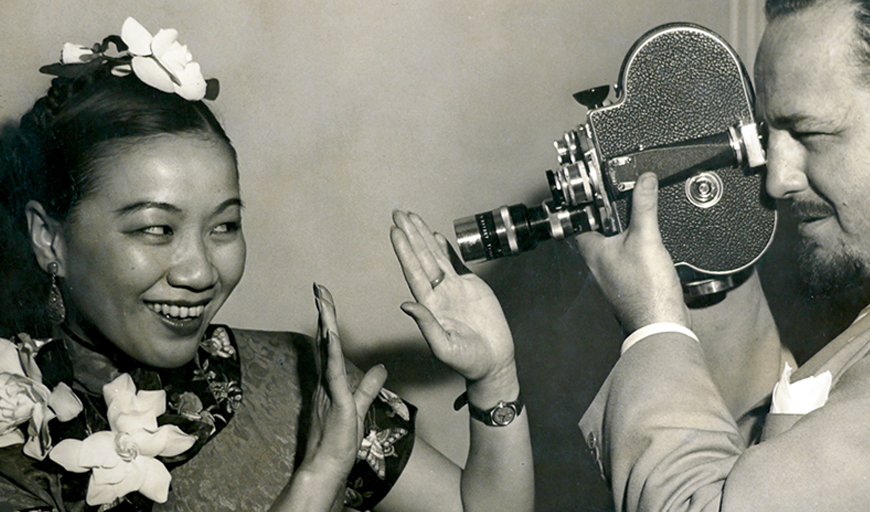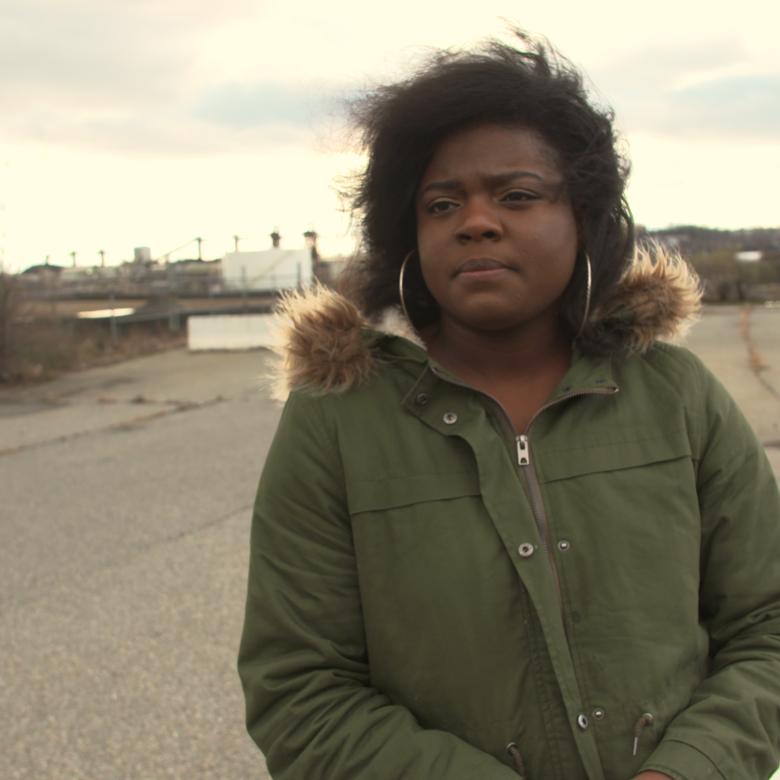The Envelope Please...

With apologies to Alfred Tennyson: In the Spring, a young filmmaker’s fancy lightly turns to thoughts of… awards. Yes, ‘tis the season of the Academy Awards, with nominations to be announced late March and the televised extravaganza a month later.
The first Academy Awards ceremony was a small affair, a private dinner hosted by Douglas Fairbanks on May 16, 1929. About 270 people witnessed the event in the Hollywood Roosevelt Hotel. Today nearly 25 million viewers worldwide tune into the Oscars gala (in my research, I found many interesting facts pertaining to the history of the Academy Awards and have included them at the conclusion of this article).
With the excitement of awards season in the air, it seems a good time to tout the award-winning films and filmmakers of New Day. The range of categories in which awards have been won reflects a broad spectrum of artistic achievement and social impact. The honors that have been bestowed upon the films and filmmakers are from some of the most respected institutions in the industry.
In the spirit of the season, we offer our own awards show, which we are coining the New Daisy, featuring some incredible films from the New Day trophy case. We are proud to highlight these award-winning films, plus a selection of "honorable mentions" that are equally acclaimed. Without further ado, and in alphabetical order, we bring you the New Daisies, featuring some of the very best from the collective’s virtual vault.
Samantha Farinella’s Hunting in Wartime profiles Tlingit veterans from Hoonah, Alaska who saw combat during the Vietnam War. The veterans talk about surviving trauma, relating to Vietnamese civilians, readjusting to civilian life, and serving a government that systematically oppresses native people. Their stories give an important human face to the combat soldiers and depict the enduring effects of war on individuals, families, and communities.
Samantha Farinella’s film was celebrated for its artistic achievements by receiving the Excellence in Documentary Filmmaking Award at the Inwood Film Festival as well as the Big Sky Award from the highly respected Big Sky Film Festival.

In Robin Lung’s Finding Kukan, the filmmaker investigates the forgotten story of Li Ling-Ai, the uncredited female producer of Kukan, an Academy Award-winning color documentary about World War II China that has been lost for decades. Kukan, a groundbreaking film that exposed the atrocities of World War II China to global audiences, was the first American feature documentary to earn an Academy Award in 1942. When Robin Lung discovers a badly damaged film print of the “lost” Kukan, she pieces together the inspirational tale of the two renegades behind its making – Chinese American playwright Li Ling-Ai and cameraman Rey Scott. Through a dynamic mix of verite, archival, and reenactment footage, Finding Kukan creates a portrait of a female filmmaking pioneer, and illuminates the history of racial and gender bias behind the camera, still reverberating in Hollywood.
Robin Lung’s dynamic documentary was recognized in 2019 by the American Library Association as a Notable Film for Adults. Finding Kukan also won the Courage in Cinema Award as a part of the UMASS Boston Film Series.

Tom Shepard’s Scout’s Honor tracks the conflict between the anti-gay policies of the Boy Scouts of America and the broad-based movement by many of its members to overturn them. The story is told predominantly through the experiences of a 13-year old boy and a 70-year old man – both heterosexual, both dedicated to the Scouts, and both determined to change the course of Scouting history.
Tom Shepard earned two top honors from the highly prestigious Sundance Film Festival in 2001. Scout’s Honor won the Audience Award for Best Documentary and the Freedom of Expression Award.

Trust Me by Joe Phelps and Rosemary Smith.
Rosemary Smith’s and Joe Phelps' Trust Me reveals how an avalanche of negative news and misinformation is making the world a terrifying place. This has led to mistrust of others, racism, polarization, mental health disorders, and crime. The film demonstrates how sensational media takes advantage of our survival instincts to gain more clicks and ad revenue with scary headlines – many of which are not true. Trust Me uses original global stories, facts, and experts to show where the world stands and a better way to consume media.
Trust Me won numerous awards, including: IndieFest’s Best Documentary and Best Educational Film as well as Best Documentary by Flicker’s Film Festival.
Maggie Burnette Stogner’s Unbreathable: The Fight for Healthy Air is a timely and powerful exploration of fifty years of the Clean Air Act and the challenges still being confronted to ensure healthy air for everyone. Weaving historical milestones with current day stories of environmental injustice, the documentary is an excellent tool for educational and community engagement.
Maggie Burnette Stogner’s documentary captured several honors in 2020, among them the Chesapeake Film Festival’s Best Environmental Film and the Impact Doc Awards of Merit.
From the New Day catalogue, here is a sampling of our many highly honored documentaries:
Kelly Anderson & Tami Gold, Every Mother’s Son
Audience Award, Tribeca Film Festival (2004)
Ronit Bezalel, 70 Acres in Chicago: Cabrini Green
Best Documentary, Collected Voices Film Festival (2016)
Marlene Booth, Pidgin: The Voice of Hawai’i
Best Human Rights Film, Honolulu Film Festival, (2010)
Liane Brandon, Anything You Want To Be
Blue Ribbon, American Film Festival (1972)
Rodney Evans, Vision Portraits
Grand Jury Prize for Outstanding Feature Documentary, San Francisco Internat’l LGBTQ+ Film Festival (2019)
Cheryl Green, Who Am I To Stop It: Dani’s Story
Disability Justice Award, Superfest International Disability Film Festival (2018)
Victor Ilyukhin & Olga Lvoff, Busy Inside
Audience Award Best Feature, Middlebury New Filmmakers Film Festival (2019)
Chithra Jeyaram, Foreign Puzzle
Best Feature Documentary, Fayetteville Film Fest (2020)
Larissa Lam & Baldwin Chiu, Far East Deep South
Best Documentary-Audience Award, Center for Asian American Media - CAAM Fest (2020)
Helen Cohen & Mark Lipman, States of Grace
Best Video Documentaries, Video Librarian (2016)
Susanne Mason, Writ Writer
Best Documentary, Silver Gavel, American Bar Association (2009)
Lisa Molomot, Soledad
Best Documentary, Global Impact Film Festival (2020)
Jacki Ochs, Vietnam: The Secret Agent
Certificate of Special Merit, Academy of Motion Picture Arts and Sciences (1984)
Jon Osaki, Alternative Facts: The Lies of Executive Order 9066
Humanitarian Award, Accolade Global Film Competition (2019)
Robert Richter, Father Roy: Inside the School of Assassins
CINE Golden Eagle (1996)
Jay Rosenstein, The Lord Is Not On Trial Here Today
Silver Gavel Award, American Bar Association (2011)
Michael Rowley, Hurdle
Best Documentary Feature Film Gold Jury Award, Social Justice Film Festival (2019)
Greta Schiller, The Marion Lake Story: Defeating the Mighty Phragmite
Environmentalist of the Year, The North Fork Environmental Council (2014)
Meghan Shea, How I Live
Best Director, Chambal Film Festival (2020)
Harleen Singh, Drawn Together: Comics Diversity and Stereotypes
Best Documentary, People of Passion International Film Festival (2019)
Pam Sporn, Detroit 48202: Conversations Along a Postal Route
Special Jury Award, Santiago Alvarez International Documentary Festival (2020)
Theo Rigby, Sin Pais (Without Country)
Student Academy Award, (2011)
Interesting facts discovered on the history of the Academy Awards:
The Academy Awards, honoring artistic and technical merit, are considered the entertainment industry’s gold standard. Assessed by the Academy’s voting membership and bestowed annually, the awards are international recognition of excellence in cinematic achievement.
The various category winners receive a copy of a golden statuette, called the “Academy Award of Merit.” The trophy, depicting a knight rendered in art deco style, is popularly known as “Oscar.” The knight holds a crusader’s sword and stands on a reel of film with five spokes. The spokes represent the original divisions of the Academy: Actors, Writers, Directors, Producers, and Technicians.
The first radio broadcast of the awards presentation was in 1930. In 1953, the event was first televised. It is the oldest worldwide entertainment awards ceremony. The Emmy Awards (television), the Tony Awards (theater), and the Grammy Awards (music) are modeled after the Academy Awards. Since its inception, more than 3,000 Oscars have been awarded.
In 1939, The Academy adopted the nickname “Oscar” for the trophies. The origin of the nickname is in dispute. One account claims legendary actress Bette Davis named the award after her first husband, band leader Harmon Oscar Nelson. Another possible source of the name is Margaret Herrick, the Academy executive secretary. When she first saw the trophy in 1931, Margaret said the statuette reminded her of her “Uncle Oscar,” a nickname for her cousin Oscar Pierce.
The Academy credits columnist Sidney Skolsky with the first confirmed newspaper reference to Oscar in his column following the presentations in March, 1934. In that year’s ceremony, Walt Disney was the first to thank the Academy for his “Oscar” during his acceptance speech.
At the 29th ceremony, in 1957, the Best Foreign Language Film category, now known as Best International Feature Film, was introduced. Until then, foreign-language films had been honored with the Special Achievement Award. Parasite became the first foreign language film to earn Best Picture at the 2020 ceremony.
Due to Covid-19, the Academy has announced that for the 2021 ceremony, streaming movies would be eligible. The Academy hopes it won’t be long before it reinstates the requirement that movies be shown in theaters.
